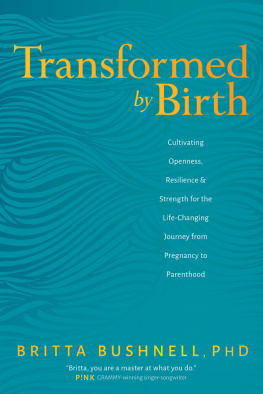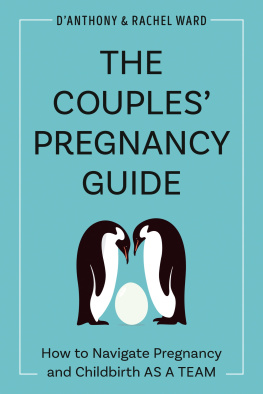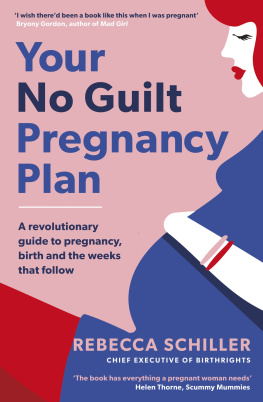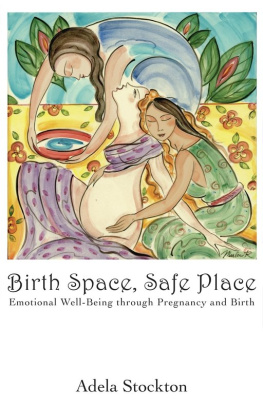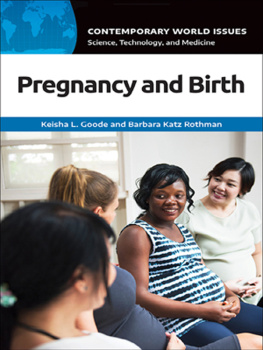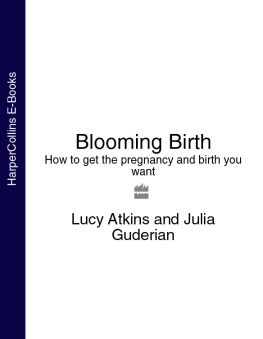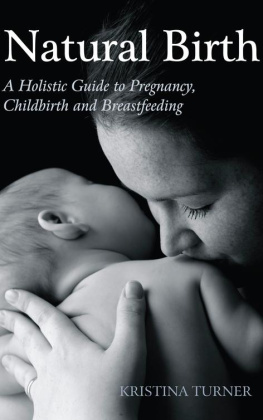Contents
Guide

TO KADEN AND RUMIAH
whose births transformed me
body, heart, and soul.
Being your mom has been
the greatest joy and
privilege of my life.
TO MY MOM, PAULA,
for loving and supporting me
from day one, including during
my pregnancy, birth, and
postpartum journeys.
Your legacy is woven throughout
the pages of this book.
AND TO ALL PARENTS ON THE
TRANSFORMATIVE JOURNEY
INTO PARENTHOOD.
Everything changed. Every cell, every thought, every feeling, every heartbeat, every breath, every sensation, every moment changed forever. Giving birth is like being put in a crack in the universe, in a space between being and becoming, between restful stillness and dynamic growth and change. It was the most empowering and humbling experience Ive ever had.
EMILY
Contents
INTRODUCTION: No Right Way to Birth
Like many first-time parents, Katrina immersed herself in books, podcasts, and blogs in preparation for birth. Riveted by a documentary about home birth with midwives, she watched until the end, at which point, she burst into tears.
As Katrina shared this story with me, I thought I understood her feelings. Many parents cry when they see images of birth; they are moved, touched, and inspired by the images that will one day, they hope, be the journey they will take. Listening, I nodded in understanding. Katrina stopped me. No, she said. I burst into tears because that was the first time I learned there was a right way to give birth. Katrina felt the pressure of doing birth right. She thought to herself, What if I cant do that?
Parents are told by friends and family members the right way to birth. These include opinions about the right hospital, doctor or midwife, type of pain management be it medication or hypnosis and so on. The right way to birth ranges from unassisted without any medically trained professionals in attendance to scheduled elective cesarean births. Opinions vary.
Many pregnant parents feel the same agonizing pressure that Katrina felt to do birth right. The intensity and competition in pregnancy and parenthood rivals that of Olympic events. Upon entering these realms, the focus on getting it right permeates the landscape.
Birth is becoming increasingly polarized; there is more judgment than ever about right ways to birth. The polarization evident within our political system, and society as a whole, is strongly represented in the politics, policy, and culture of birth today. Long before the mommy wars make their way to playgrounds, they start on the battlefield of birth.
One such polarization of rightness is between the natural and medical birth communities. The battle cries sound something like this: Birth is natural, not a medical event! Hospitals are for sick people! to Birthing at home is irresponsible; what if something were to happen? and, We live in the twenty-first century; we dont have to birth like animals! These binary and polarized camps have done little to ease the mommy wars. Instead, the division is the perfect petri dish to breed judgment judgment between parents, couples, birth professionals, and even against ourselves.
What can we do instead?
Many people tell pregnant and new parents to follow their intuition. This can be helpful advice if you can easily access your inner wisdom through the fog of so many opinions! It can be difficult to even know where to begin to look for the information you desire.
In need of answers, parents head out in search of evidence that will prove the rightness of one approach or another. Heres the problem: In this era of easily accessed information, we can find proof to support whatever were looking for. Want proof that a hospital birth is the safest way to birth? You can find it. Want proof that home birth is the safest way to birth? Yep. You can find that too. So, whats a thoughtful and engaged parent to do?
Transformed by Birth does something more than simply arming parents with more information in our already data-inundated culture. It shares wisdom and proven practices to support having a transformational experience of birth, rather than prescribing specific outcomes. In my experience as a birth doula, childbirth educator, and mother, I have seen firsthand and heard many personal stories of births that span the full gamut from transformative and empowering cesarean births to traumatic unmedicated home births and nearly everything in-between. Outcome alone does not dictate the impact of any given birth. Lots of factors influence the experience of birth. And while outcome is important, a singular focus on outcome sidelines both the parents experience and the transformation that goes far beyond the time of labor and birth, no matter where or how birth happens.
A MEANING-MAKING SPECIES
Humans are a meaning-making species. We crave understanding and meaning, especially around events that defy classification. Those events that reside outside of easy definition, explanation, or clarity often find their home in the language of ritual and myth. Giving birth is one such existential experience.
As animals, survival both as a species and as individuals is of monumental importance; it is the thing that matters most. Therefore, surviving birth is tantamount to evolutionary success. But it is not just births importance on the evolutionary report card that keeps us engaged with childbirth even when survival is usual. I believe it is childbirths fundamental character as a rite of passage, as a moment of great transformation created by our biology our nature that catapults it into prominence.
There are few moments in a persons life that expose us to such radical change as does the act of giving birth for the first time. Weddings take place with a great deal of ceremony and celebration within our culture, some religions still ritualize coming of age, and death is honored with funerals, but birth, childbirth, makes us into something new whether we ritualize it or not. So even while Western culture celebrates birth with few meaningful ceremonies, birth has maintained its place in the overall importance of things because of its evolutionary value, but also because it utterly transforms us, and in the process, shakes the bedrock of our personal world.
When individuals feel vulnerable, what we believe in and what we value most rise to the surface. Facing the act of giving birth, we are tuned in to our innate vulnerability. We strive for security. In contemporary culture, control is worshipped, and as a result, we lean on science, technology, reason, order, and predictability to help us feel safe. Birth practices all along the medical/natural spectrum rally these allies to provide a salve to the underlying anxiety birth produces. Childbirth and new parenthood cause us to question who we are and what we value. Existential anxiety is to be expected.
Its normal to crave understanding and control. Mystery and uncertainty are not comfortable sensations for most of us, and modern advancements have reduced our familiarity with these feelings. In todays society, few experiences reside outside of intellectual understanding and mechanistic control. Gone are the days where few things were understood scientifically, where explanation was handled almost exclusively by the myths and stories of a people, where healing was addressed ritualistically, and mystery was a daily companion.
As a species, weve come a long way. We understand so much more about how the world works. No longer is a story about a goddess mourning her daughters time in the Underworld relied upon to explain changing seasons. (While this particular story is of Greek origin, each culture had, or still has, its own stories to explain elements of the world that were not understood.) Now we understand the tilting axis of the Earth in its orbit around the sun. In some ways, we have replaced one story with another. It could be said that science has become the most widespread human mythology. It has an explanation for everything, or at least we like to believe it does. Science has soothed much of the anxiety that arises in the face of mystery.
Next page
